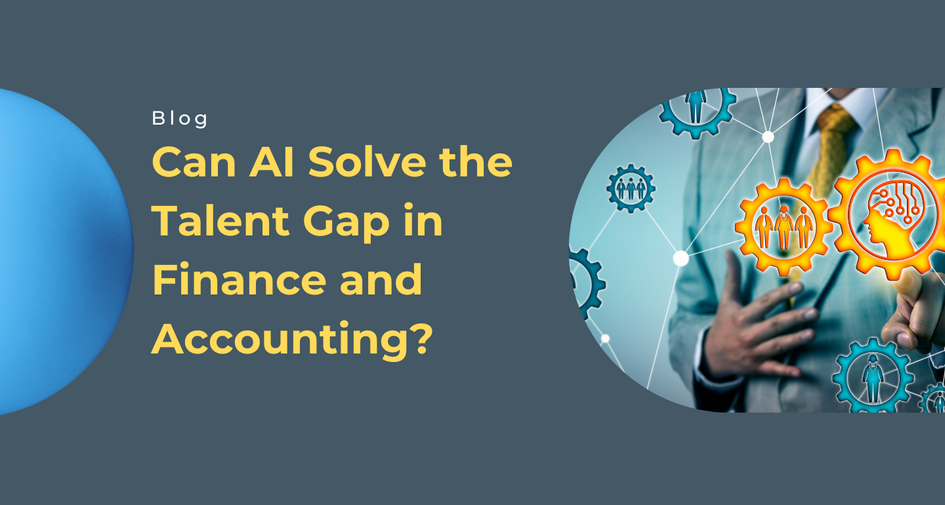Can AI Solve the Talent Gap in Finance and Accounting?

The finance and accounting industries face a critical challenge: a growing talent gap. As baby boomers retire, fewer professionals are entering fields like accounting, and early career accounting and finance professionals are obtaining their CPA designation at declining rates. This shortage is felt worldwide, particularly as financial complexity increases across industries. But can artificial intelligence (AI) fill the gap?
While AI isn't a complete solution to the talent crisis, it offers a powerful toolset that can transform the way finance & accounting professionals work and the way companies interface with the vast amount of business data available. By automating repetitive tasks and enabling advanced analytics, AI allows teams to do more with less. More importantly, it enables skilled professionals to broaden their impact by focusing on strategic, value-adding activities, leveraging the data-driven insights now available due to smart AI tools and integrations.
Is there ACTUALLY a “talent gap” in finance and accounting?
The accounting and finance sectors have been under pressure due to the talent shortage for years. In the U.S. alone, the demand for accountants is outpacing supply, with fewer undergraduates studying accounting, and unsurprisingly fewer graduates sitting for the CPA exam annually (AICPA via CFO.com). On the other end of this equation, a whole generation of accountants and finance pros are approaching retirement, with 65% of those currently in the industry contemplating other career routes. Short of going back in time and marketing an accounting career as an attractive path to undergrads (or maybe getting the Big Four to ease up on their associates), the CPA shortage has forced organizations to find creative ways to handle increasing workloads while maintaining quality and accuracy.
It’s not just about the lack of CPAs; it’s about the evolving demands and scope creep of a “finance career” in this day and age. This talent crunch is not only about numbers but also about the complexity of the skills required. In an increasingly digital and data-driven world, finance teams are expected to manage large volumes of data, provide real-time insights, and support business decisions with rigorous analysis. As noted by the Institute of Chartered Accountants in England and Wales (ICAEW), there is a skills gap in finance professionals who can both leverage AI and bring advanced analytical capabilities to the table.
AI as a Solution: Automating repetitive tasks to fill the gap
AI excels at automating routine, repetitive tasks—those that often bog down accountants and finance professionals from a time perspective and require absolute accuracy. Ironically, the manual nature of these tasks (collections, invoice processing, cash application, and auditing) are time-consuming and manual, opening the door to inefficiencies and human error. Ideally, AI-powered tools would take over these tactical finance processes, allowing finance professionals to focus on higher-order tasks.
For instance, AI-driven automation is making strides in accounts payable and receivable, bank reconciliations, and compliance checks. This technology ensures that transactions are processed quickly and accurately, freeing up valuable time for professionals to focus on strategic planning, client advisory, and financial forecasting.
A 2024 report by TOA Global illustrates that AI solutions can handle up to 70% of transactional accounting tasks.
This is particularly significant when you consider the daily workloads of finance professionals. The same report suggests that AI could reduce the labor-intensive workload of accounting departments by up to 25%, alleviating the burden from an overstretched workforce.
Empowering Smarter, More Strategic Work
Beyond automation, AI empowers finance professionals by providing data and insights that were previously inaccessible. Machine learning algorithms can sift through massive datasets, identify trends, and even predict future outcomes. This level of predictive analytics was once available only to data scientists, but now finance teams can use these tools to improve financial forecasting, risk management, and investment decisions.
At the leadership level, AI is helping CFOs and VPs of finance move from reactive to proactive roles. With real-time data and advanced analytics, finance leaders can predict trends and make strategic decisions faster and with the confidence that data enables. AI also fosters collaboration across departments by breaking down data silos, offering a holistic view of financial health, and enabling cross-functional insights.
Augmenting, Not Replacing, Human Talent
One important misconception is that AI will replace accountants and finance professionals — that’s not the reality we envision. What we’ve seen is how finance departments are supercharged when AI complements human talent. AI handles tasks that are time-consuming, repetitive, and prone to error, while human professionals focus on complex problem-solving, decision-making, and relationship management.
As highlighted by Nasdaq, while AI will take over the transactional aspects of finance, it will not eliminate the need for human expertise in judgment, creativity, and strategic thinking.
By 2025, AI is expected to be embedded into most finance functions. Companies that harness its full potential will not only close the talent gap but also create finance departments that are more agile and more insightful than ever before.